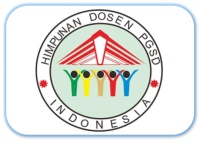Peningkatan Hasil Belajar Tematik Terpadu Peserta Didik Menggunakan Model Problem-Based Learning di Kelas V Sekolah Dasar
Abstract
The purpose of this study is to explain the improvement of student learning outcomes in integrated thematic learning elementary schools. This research is a Classroom Action Research (CAR) with qualitative and quantitative approaches. CAR is an action carried out by the teacher or together (collaboration) in the class by designing, implementing, observing and reflecting on actions using several cycles in a collaborative and participatory manner with the aim of improving and enhancing the quality of the learning process in the class. The research subject was 24 teachers and students at SDN 03 Padang Marapalam, Lengayang District, Pesisir Selatan Regency, consisting of 14 male students and 10 female students. Student learning outcomes can increase if learning uses the PBL model, this situation can be seen from the results of observing the Learning Implementation Plan (RPP) in cycle I 86.11% increasing to 94.44% in cycle II. In the results of observing the implementation of learning, the percentage for observing teacher activity in the first cycle was 80.36%, increasing to 92.85% in the second cycle. Based on the observations of students in the first cycle, 80.36% increased to 92.85% in the second cycle.
Keywords
Full Text:
PDFReferences
Adriadi, A., & Tarihoran, N. (2016). Pembelajaran Problem Based Learning (PBL) dan Motivasi Siswa Terhadap Hasil Belajar PAI di SMP Negeri 1 Ciruas-Serang. Jurnal Kajian Keislaman, 3(2), 15–38.
Amris, F. K., & Desyandri. (2021). Pembelajaran Tematik Terpadu Menggunakan Model Problem Based Learning di Sekolah Dasar. Jurnal Basicedu, 5(4), 2173. Retrieved from https://jbasic.org/index.php/basicedu/article/view/1170/pdf
Arikunto, S. (2014). Prosedur Penelitian. Jakarta: Pt Rineka Cipta.
Astimar, N., & Indrawati, T. (2014). Penggunaan Model PBL dalam Pembelajaran IPA di Kelas IV Sekolah Dasar X Tanah Datar. Jurnal Ilmiah Ilmu Pendidikan, XIV(2), 98.
Emda, A. (2014). Penerapan Moeel Pembelajaran Kooperatif Tipe TPS di SMA Negeri 12 Banda Aceh. Jurnal Lantanida, 1(1), 71.
Fimala, Y., Firman, F., & Desyandri. (2021). Hubungan Motivasi Belajar dengan Hasil Belajar Siswa di Sekolah Dasar. Jurnal Pendidikan Tambusai, 5(1), 150.
Hermawan, Y. C., Juliani, W. I., & Widodo, H. (2020). Konsep Kurikulum dan Kurikulum Pendidikan Islam. Jurnal MUDARRISUNA, 10(1), 38–39.
Husna, Y., & Yunisrul. (2020). Peningkatan Hasil Belajar Siswa Menggunakan Model Kooperatif Tipe TPS di Kelas IV Sekolah Dasar. Jurnal Pendidikan Tambusai, 4(3), 2928.
Juanda, A. (2016). Penelitian Tindakan Kelas. Yogyakarta: CV Budi Utama.
Kemendikbud. (2018). Panduan Penilaian untuk Sekolah Dasar (SD). Jakarta: Kementrian Pendidikan dan Kebudayaan.
Mareti, J. W., & Putri, A. H. dwi. (2021). Model Problem Based Learning Untuk Meningkatkan Kemampuan Berpikir Kritis dan Hasil Belajar IPA Siswa. Jurnal Elementaria Edukasia, 4(1), 34. https://doi.org/10.31949/jee.v6i1.
Mulyasa, E. (2017). Manajemen Berbasis Sekolah. Bandung: PT Remaja Rosdakarya.
Muzria, W., & Indrawati, T. (2020). Pengaruh Model Project Based Learning terhadap Hasil Belajar Siswa pada Pembelajaran Tematik Terpadu Sekolah Dasar. Jurnal Pendidikan Tambusai, 4(3), 2232–2233.
Purwati, N., & Yunisrul. (2020). Pengaruh strategi Active Learning tipe Index Card Match terhadap Hasil Belajar Tematik Terpadu kelas III Sekolah Dasar. Jurnal Pendidikan Tambusai, 4(3), 1972–1973.
Putri, V. M., & Indrawati, T. (2020). Peningkatan Hasil Belajar Pembelajaran Tematik Terpadu Menggunakan Model Cooperative Learning Tipe Two Stay Two Stray di Kelas V Sekolah Dasar. Jurnal Pendidikan Tambusai, 4(3), 3332.
Saleh, M. (2013). Strategi Pembelajaran FIQH dengan Problem-Based Learning. Jurnal Ilmiah DIDAKTIKA, XIV(1), 208.
Saputra, R., & Lena, M. S. (2022). Peningkatan Hasil Belajar Siswa Menggunakan Model Problem Based Learning (PBL) pada Pembelajaran Tematik Terpadu di Kelas V SDN 24 Parupuk Tabing. Jurnal Pendidikan Dan Konseling, 4(5), 367–369.
Setyaningrum, M. (2018). Peningkatan Hasil Belajar Menggunakan Model Problem Based Learning (PBL) pada Siswa Kelas 5 SD. Jurnal Riset Teknologi Dan Inovasi Pendidikan, 1(2), 101–107.
Sulhan, A., & Khairi, A. K. (2019). Konsep Dasar Pembelajaran Tematik di Sekolah Dasar (SD/MI). Mataram: FTK UIN Mataram.
Suyatno. (2020). Analisis Kompetensi Penyususnan Rencana Pelaksanaan Pembelajaran (RPP) Guru Bahasa Arab Madrasah Tsanawiyah. Jurnal Pendidikan Dan Pelatihan, 4(1), 16–17.
Tanzeh, A., Ningsih, D. A., Sokip, & Akhyak. (2019). Influence Learning Model PBL (Problem Based Learning) on the Activities and Student Results. Journal of Advances in Education and Philosophy, 3(7), 266. https://doi.org/10.21276/jaep.2019.3.7.3
DOI: http://dx.doi.org/10.24036/e-jipsd.v11i2.14484


